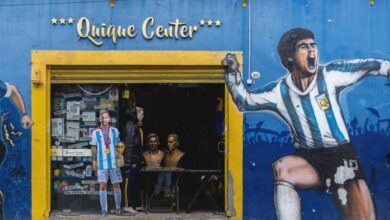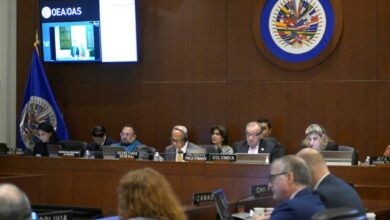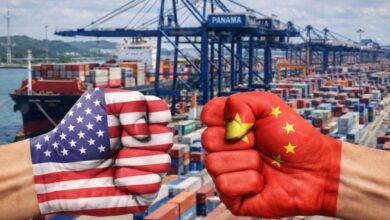Morocco dodged the bullet with the 2026 World Cup
For a country like Morocco, with no major tradition or football infrastructure, organizing this World Cup could mean ruin

On Wednesday, FIFA, the world's top soccer body, announced that the World Cup to be played in the year 2026 will be organized jointly by the United States, Mexico, and Canada. This World Cup, the first in which 48 teams would participate, 16 more than the 32 that are currently participating, is one of the greatest sports projects in history and to make it a reality will require a monumental investment.
Morocco, the only country that competed against the joint proposal of North America, lost the vote to be the next host with only 65 votes against the 134 of the so-called United 2026 composed by United States, Mexico, and Canada.
Leer en español: De la que se salvó Marruecos con el mundial de 2026
This was the fifth attempt by the Moroccan Football Federation to get FIFA to give them a World Cup, and although the frustration that the federation must feel is understandable, they must feel lucky. While for a country like the United States, organizing a World Cup can be a great opportunity, for a country like Morocco it can become an economic headache.
Why do countries want to organize worldwide?
Naturally, countries are running to host a World Cup with a rational ambition in mind. The idea is that the incentives provided by organizing the event will have long-term benefits. This means that all the improvements in tourism and sports infrastructure, subsequently, can be used by the population.
In addition, it is expected that the organization of an event of this magnitude will leave income for the country in the short term. This means that the profits that the country obtains when housing a tourist mass of this proportion, which for the 2014 World Cup in Brazil reached 6.4 million people, and to provide them with goods and services, must represent a gain compared to the investment the country made in infrastructure, logistics, and transportation.
Finally, although in principle it is not an economic benefit, there is an element of prestige around organizing the biggest event of the most popular sport in the world, especially if the event goes particularly well. This, added to the exposure that the country receives, is something that can be capitalized to increase tourism in the future.
Brazil and South Africa, bad omen for Morocco
The ambitions of the organizing countries, at least in the cases of Brazil and South Africa, were not fully met. Although both in the case of Brazil and South Africa, the 64 games of the World Cup took place without eventualities, it is difficult to argue that they yielded the expected economic benefits.
The case of South Africa, for example, gives much to talk about, because despite a monumental investment of 2.4 billion dollars in renovations and stadium construction, the newly inaugurated infrastructure, world class to meet the standards of the FIFA, quickly fell IGNORE INTO disuse.
This is due to the fact that, in the years close to the 2010 football world cup, the teams of the South African football league had difficulties attracting the public necessary to make full use of the new sports venues. According to The Guardian, with the exception of the Kaizer Chiefs and the Orlando Pirates, the two main South African clubs, which frequently attract over 50 thousand spectators, the matches of this league average between 500 and 5,000 spectators. Considering that the stadiums built for the World Cup must be able to accommodate over 40,000 spectators, the number is disappointing.
In Brazil, a country synonymous with football, with long-established clubs and ample fans, it would be expected that this would not happen, because the new stadiums would always be used by the supporters of one of their many important teams. However, they have also had problems maintaining some of their stadiums.
For example, according to the portal National Public Radio (NPR), the Mané Garrincha stadium, in the city of Brasilia, the most expensive of the constructions of Brazil for the World Cup that year, costing 550 million dollars, was reached turn IGNORE INTO a bus parking because of disuse.
The Arena Pantanal, in the city of Cuiabá, which cost 215 million dollars, was also a victim of the deterioration after the World Cup. According to information from NPR, the stadium was closed many times because of 'structural problems' and was even invaded by homeless people who settled in the dressing rooms.
For Morocco, which would need to build 6 new stadiums, this must have been a concern when presenting its plan to FIFA. Adapting infrastructure, particularly stadiums and transportation, is the biggest expense in the organization of a football world cup and, therefore, one of the greatest determinants for the economic success of the event for the host country.
Although it has a league with more tradition than South Africa, Morocco simply does not have enough fans to consistently make use of 12 stadiums with more than 40,000 spectators. This shows the typical characteristics of a situation that would leave behind more than one of the so-called white elephants, those huge projects for events that are forgotten as monuments to bad planning.
On the other hand, for the United States, Mexico, and Canada, this does not have to be among their concerns. With dozens of stadiums of the highest quality and capacity, a highly developed tourism infrastructure and experience organizing large-scale events, the costs faced by these countries are lower. Therefore, profitability is better assured.
Morocco should be grateful not to have been chosen as the next venue, in addition, because the first world championship of 48 teams represents an unknown challenge, particularly in regard to the financial and logistics, which would have questioned the capacity of a first-time organizer. For Morocco, it is necessary to be thankful that the fifth was not the lucky one either.
Latin American Post | Pedro Bernal
Translated from "De la que se salvó Marruecos con el mundial de 2026"





